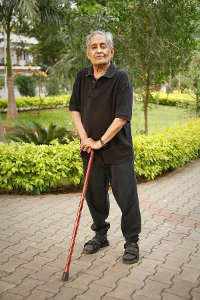Residential Care Admission Process for Special Individuals or Circumstances: Difference between revisions
Nate Russell (talk | contribs) No edit summary |
Nate Russell (talk | contribs) |
(No difference)
| |
Revision as of 22:28, 24 July 2014
Admission of Veterans[edit]
If a veteran is eligible for residential care services, the local health authority is required to contact Veterans Affairs Canada to assess if the veteran is eligible for federal benefits that may help defray costs. Veterans Affair Canada will also arrange placement on the veterans’ priority access bed waitlist in facilities with veterans’ priority access beds. (1)
Admission of Aboriginal Residents[edit]
Home and Community Care Policy states:
- “Aboriginal Affairs and Northern Development Canada is financially responsible for status or non-status Aboriginal clients who were residing on a reserve prior to entering an assisted living residence or residential care facility, provided the client is admitted to a residence or facility where Aboriginal Affairs and Northern Development Canada is authorized to pay for the care.”(2)
Admission of Spouses with Different Care Needs[edit]
Health authorities are not required to admit individuals into publicly subsidized residential care facilities who do not meet the criteria for residential care services. In the past this lack of flexibility created significant distress for couples who have been together for a half century or longer, and who have been forced to live apart because of different care needs. (3) Home and Community Care Policy has recognized this and now tries to address the problem. (4)
Health authorities are required to explore reasonable arrangements with the couple and their family “in a collaborative approach” to that would enable spouses to maintain and support their relationship. There are a number of possibilities, including arranging transportation for non driving spouse and, on rare occasions, co-locating the spouse in the facility.(5)
Admission of Sponsored Immigrants Needing Care[edit]

Sponsorship is a legal agreement between a sponsor, a sponsored family member (typically a parent or grandparent) and the Government of Canada that allows the family member to permanently reside in Canada and receive needed financial support from the sponsor.
The sponsor has signed an undertaking and committed to provide the sponsored person with the basic requirements for daily living for ten years (this has recently increased to twenty years for new sponsorships). During that period, the sponsored person cannot apply for government benefits such as Old Age Security, Guaranteed Income, or social assistance.
The sponsor is responsible for meeting the person’s basic requirements which includes: food, clothing, a place to live, fuel, utilities, household supplies, personal requirements, and health care not provided by public health. The sponsor is also responsible for costs such as the co-payment fees for a residential care facility as well as all medical expenses not covered by the provincial health plan.
References[edit]
- For more information on Veterans and Residential Care matters such as client rates, see: HCC Policy Manual. (Effective: April 1, 2013). Chapter: 7 Client Rates Section 7.B.4 (Income-Based Client Rates); also Subsection: 4 Alternate Payers. Also, Chapter: 6 Residential Care Services Number: 6.D Access To Services.
- Ibid.
- See HCC Policy 6.C. Residential Care Services, Service Needs Determination.
- HCC Policy Manual. Chapter: 6 Residential Care Services Number: 6.D.1 Section: D Access To Services Page: 3 of 3 Subsection: 1 Supporting spouses with differing care needs
- HCC Policy Manual. Ibid.
| This information applies to British Columbia, Canada. Last reviewed for legal accuracy by BC Centre for Elder Advocacy and Support, June 2014. |
